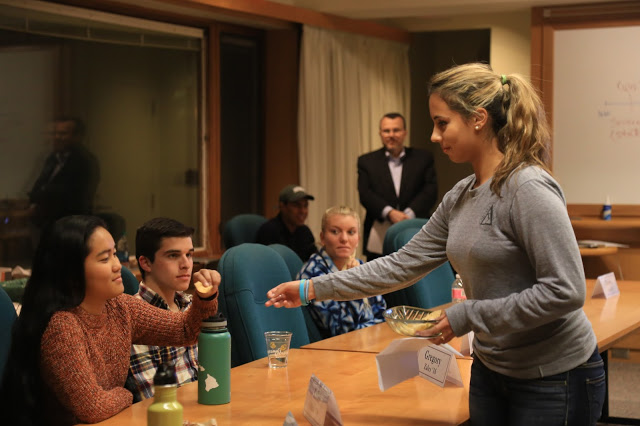On October 5th, Dartmouth’s RGLP welcomed Dr. Gama Perucci to facilitate a session about global leadership. He began the session by discussing the historical context of global leadership, providing an overview of significant moments that have shaped globalization. Starting with the Thirty Years War by assigning various roles such as Catholic Queen, Protestant King and Peasant to the students, he demonstrated the conflict that would have surrounded uncertain borders. He then discussed the importance of the Peace of Westphalia, which established the concept of national sovereignty, the significance of internationally recognized borders, and the creation of statehood. He continued by drawing attention to the idea of a nation versus the idea of a state by discussing the importance of building nationalism around common values, identities, etc.
 |
| Students participate in role-play to understand international conflict first-hand. Photo by May Nguyen '18. |
I found that the historical analysis of globalization that Dr. Perucci provided was interesting and important to understand the shifts in expanding and collaborating on a global scale. Dr. Perucci then spoke about global perspective by describing global awareness, global attentiveness, global consciousness, and global citizenship. It was also interesting to consider my own global perspective and how I can work towards becoming more globally conscious. Ultimately, Dr. Perucci stated that a global leader needs a transnational mindset, comfort with ambiguity, an ability to connect the dots, and cross-cultural communication skills. While I have improved my global consciousness by going on a Spanish Language Study Abroad in Argentina, and exploring different disciplines in my liberal arts education, I think I can broaden my skills by thinking more critically about a global cause I am truly passionate about.
One of the biggest takeaways I had from this session was after we did an exercise. I acted as the Female Lead and I followed a long list of instructions as part of a welcoming ceremony. It was interesting to see how as a cohort we made assumptions and judgments about this welcoming ceremony. We imposed our own cultural lens of analysis about the “subservient” role of the female lead without even thinking that the female was empowered by her deeper connection with mother earth. It is clear that as a cohort, we have much to learn about intercultural development.
-Written by Alanna Kane '17, Fall 2015 RGLP Participant
